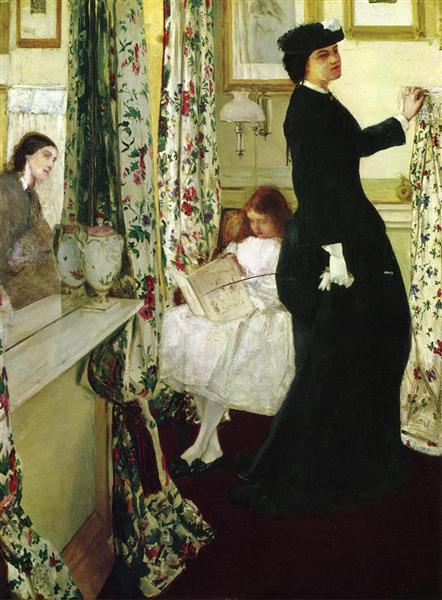Description
In 1861, James McNeill Whistler gave us a masterfully conceived work, "harmony in green and pink: the music room" ("Harmony in Green and Rose: The Music Room"), which stands as a manifesto of elegance and characteristic stillness of the nineteenth century. This painting is a clear example of Whistler's talent to transmit an atmosphere of softness and serenity through the delicate use of color and composition.
The first thing that attracts attention in "harmony in green and pink" is its color palette, dominated by soft tones and cakes that evoke a feeling of calm and sophistication. The title of the work suggests a particular emphasis on green and pink colors, which predominate in the scene and act as a conductive thread that unifies the different elements of the composition. The soft green of the tapestry paper and the curtains, together with the roses present in the dresses of the female figures, create a symmetry and visual cohesion that is pleasant and peaceful.
In the painting, we can observe three characters: two women and one girl, captured in a moment of intimate camaraderie. The adult women are sitting, one playing a piano and the other, located on their right, reading, while the girl, standing, seems to be in a time of pause, perhaps watching women or waiting for their turn to participate in the music . The disposition of these figures within the space is carefully planned to guide the viewer's gaze through the scene, facilitating a visual narrative in which each element has its own space and purpose.
The furniture and decorative elements of the room, such as piano, lamp and elegant armchairs, give the scene a refinement air and an indication of the social class of the characters represented. Whistler shows an amazing domain in the way these objects are represented: the textures, details and light that falls on them are meticulously worked, creating palpable authenticity. Every detail, from the intricate stamp of the tapestry paper to the fine fabric of the dresses, is painted with a precision that denotes not only a technical skill but also a deep respect and love for the subjects and objects represented.
In addition, "harmony in green and pink: the music room" is a testament to Whistler's interest in the fusion of arts and music. This issue becomes a visual metaphor where musical harmony is reflected in the harmony of color and composition. Such themes integration is not fortuitous, since Whistler was deeply influenced by the aesthetic theories of his time, which advocated the synthesis of the arts and the exaltation of pure beauty.
Whistler's work, including this painting, often emphasizes the balanced composition and the evocative atmosphere, fleeing the exact representations of reality and closer to an aesthetic and emotional interpretation of the world. "Harmony in green and pink" is not just a simple domestic scene; It is a composition that invites contemplation, stripping it of any unnecessary anecdote and focusing the viewer's attention on the inherent beauty of the scene.
In sum, James McNeill Whistler, with "harmony in green and pink: the music room", offers us a window to life and refined taste of its time, encapsulated in an image that distills calm, beauty and a clear harmony both both In music as in art. This work remains one of the less discussed but deeply charming gems of its prolific corpus, a living reminder of its genius to combine the visual with the evocative.
KUADROS ©, a famous paint on your wall.
Hand-made oil painting reproductions, with the quality of professional artists and the distinctive seal of KUADROS ©.
Art reproduction service with satisfaction guarantee. If you are not completely satisfied with the replica of your painting, we refund your money 100%.

